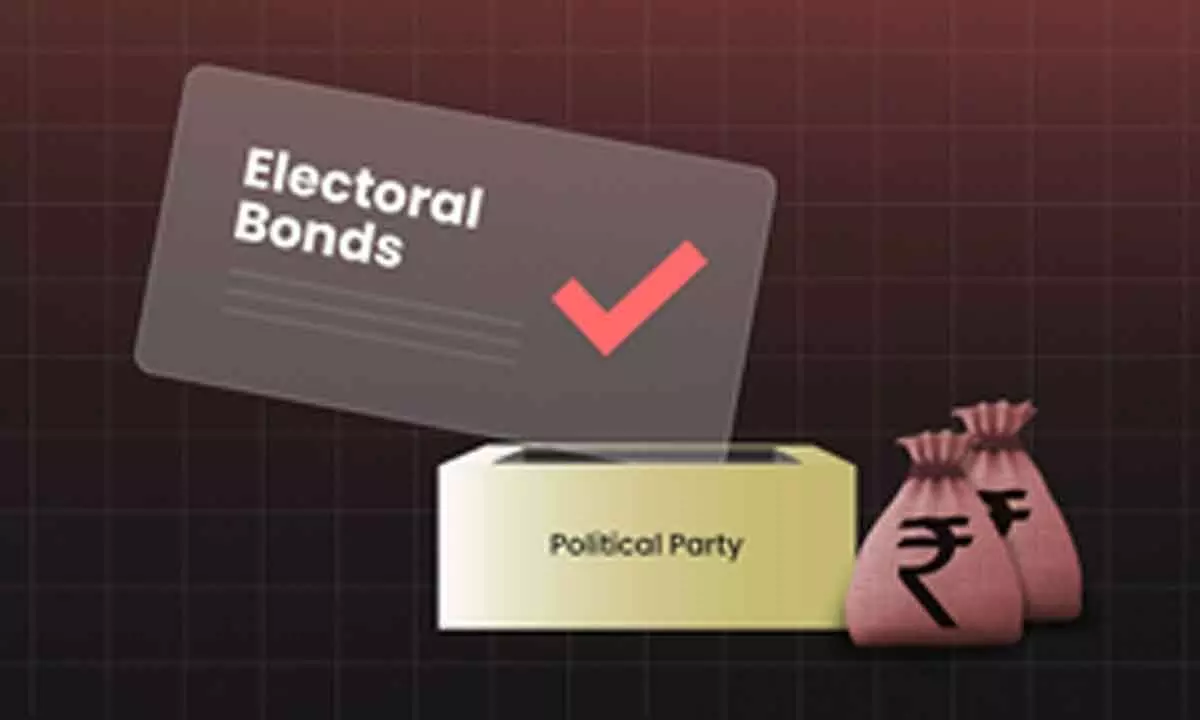Live
- 525 candidates remain in fray for 17 LS seats in Telangana
- Political Prowess on Display: Rajnath Singh and Smriti Irani's nominations galvanise BJP’s poll campaign
- TN government committee identifies 42 elephant corridors in state
- Ola Cabs CEO Hemant Bakshi steps down, firm announces job cuts
- IPL 2024: Kuldeep Yadav's 35 not out propels Delhi to 153/9 against Kolkata
- BJP leader Sambit Patra files nomination for Puri Lok Sabha seat
- Rajiv Pratap Rudy accuses Lalu Prasad of 'killing' developmental schemes in Saran
- Quick action by Telangana Cyber Security Bureau saves citizen's Rs 1 crore
- Types of food diabetics should avoid
- Celebrating National Honesty Day: 20 Quotes to Inspire Integrity
Just In
Decoding electoral bonds & political cacophony over it


The reason behind the ‘secrecy clause’ was to provide immunity to those individuals or companies who could find themselves at the receiving end, if the opposition party comes to power in the next term. However, the Supreme Court didn’t concur with this claim and dismissed this as ‘illegal practice’
New Delhi: The revelations about electoral bonds, links between corporate donors and political recipients have set off a huge political furore with Opposition parties and the ruling party trading barbs and accusing each other of benefitting from donations.
Charges of quid pro quo deals, ‘dhandha for chanda’ and corporate-parties nexus dominated the discourse after the Election Commission posted the data of donors and recipients in the public domain.
The biggest premise behind the launch of electoral bonds was to begin a crackdown on black money and stop the flow of illicit money in the economy. However, with the revelation of the parties-donors link, fresh questions emerged over its authenticity and viability. Did the bonds fail to live up to their promise, many questioned.
The biggest source of funding for political parties is donations, which they receive in various forms and sources. The parties use this fund for reach-out programs, organising public events and also campaigning during elections. Till the time electoral bonds were brought into existence in 2018, the political parties received donations in cash. Since all the contributions were received in cash no documentary evidence was maintained in this regard.
The bonds revamped the whole system of receiving political funding. State Bank of India was brought in as an intermediary where all types of donors bought electoral bonds by committing their contribution to a certain party. Whichever party the donation was intended to it used to be credited into their account and parties used to get it encashed. The identity of donors was kept secret. However, the bank was privy to all steps of donations and encashment.
The reason behind the ‘secrecy clause’ was to provide immunity to those individuals or companies who could find themselves at the receiving end, if the opposition party comes to power in the next term. However, the Supreme Court didn’t concur with this claim and dismissed this as ‘illegal practice’.
BJP emerged as the biggest beneficiary under the electoral bonds scheme, with a contribution of over Rs 6,000 crore while Trinamool Congress came second with Rs 1,609 crore contribution. Congress came at third spot, with political donations of Rs 1,421 crore via bonds.
With Rs 12,769 croes received in total for all parties, the BJP accounted for 47 per cent of political funding while TMC and Congress got 12.6 per cent and 11 per cent funding via electoral bonds.
There was a lot of hue and cry over BJP, the ruling party getting the biggest funding. Opposition parties accused it of coercing and forcing the corporates to donate to fund its campaign. However, a careful assessment of the figures shows that the BJP’s share of donations in respect to elected representatives remains much lower than other parties.
Comparing the parties on the basis of donations in relation to their respective MPs, BRS has emerged as the biggest beneficiary. Every BRS MP is seen to have received Rs 200.43 crore in funding. TDP comes second with Rs 110 crore funding for each party MP. DMK and TMC come close at third and fourth spot, with Rs 76.69 crores and Rs 73.68 crores funding. Congress, the biggest opposition party has funding of Rs 27.03 crore funding for every Parliamentarian while the BJP with its 303 MPs remains at the lowest slab, with Rs 20.03 funds for each.

© 2024 Hyderabad Media House Limited/The Hans India. All rights reserved. Powered by hocalwire.com






